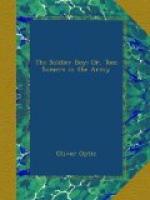“Sergeant Somers and others,” replied Captain Benson.
“Somers again!” exclaimed the colonel.
“Yes, sir. They pursued the regiment into the woods—the one that showed the flag of truce—till they were separated from the rest of us.” “Forward, Sergeant Somers,” added the colonel.
Tom modestly stepped forward, and he would have blushed if his face had not been so reddened by his previous exertions as to leave no room for a deepening of its tint.
“You did a big thing, Sergeant Somers. You broke that rebel line by your steady fire. Sergeant Somers, I thank you and the men you commanded for your good service.”
Tom bowed, and the regiment cheered. It was the proudest moment of his life to be thanked on the field, while the guns were roaring and the musketry rattling, for the good service he had rendered. It would form an excellent paragraph for his letter to Lilian Ashford, especially as he had more than once, in the perils of that exciting hour, thought of the socks he wore, and of the letter and the photograph which nestled in his breast pocket, and upon which his quick throbbing heart was beating the notes of glory and victory.
“We gave you up for lost,” said Captain Benson, as Tom returned to the line.
“We are safe, thank God!” replied Tom, “though three of our number fell in the woods, or on the field where we were chased by the rebels.”
“Sergeant Somers saved us,” added uncle Hapgood. “If he hadn’t been as cool as cowcumber, and as stiff as the mainmast of a frigate, we should have been taken, every one of us.”
“Bravo, Tom!” said the captain.
“The men stood by me like heroes, or it would have been all up with the whole of us. They are good fellows, and they deserve as much credit as I do.”
The battle continued to rage with increasing fury, till the roar, and the crash, and the sweep of armed legions beggared description. Regiments and brigades advanced and fell back with the varying fortunes of the day, but as yet there was nothing to indicate the final result.
When the men of our regiment had recovered their breath, an order came for them to proceed to the left. On their arrival at the position assigned to them, they were immediately led to the front, where the batteries which had been pouring a hot fire into the enemy were in imminent danger of being surrounded. Indeed, the swoop of the rebel infantry upon the guns had already been made, and the cannoneers had been driven from their stations. With the colonel on the right, and the adjutant in command on the left, the regiment charged upon the foe, as it had twice before charged on that eventful day, with an enthusiasm bordering upon fury.
The rebels had even spiked one of the guns, and they maintained their position with an obstinacy which promised the annihilation of one or the other of the contending forces. A desperate strife ensued, in which the least perceptible advantage was gained by the Federals. But if they could do no more, they held the enemy in check, till the gunners could charge their pieces with grape and canister, which they poured into the rebels with the most deadly effect.




